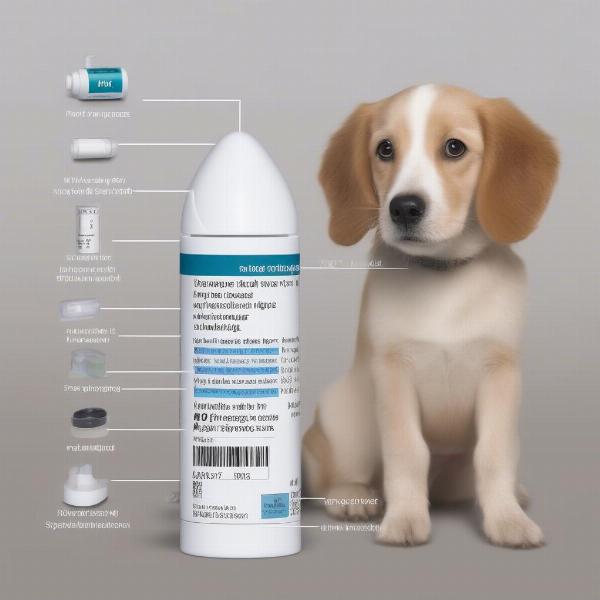Flovent, also known by its generic name fluticasone propionate, is a corticosteroid medication sometimes used in dogs to manage inflammatory airway diseases. Understanding the uses, benefits, and potential risks of Flovent is crucial for any dog owner considering this treatment option. This article will delve into everything you need to know about using Flovent for dogs, providing you with the information necessary to make informed decisions regarding your pet’s respiratory health.
What is Flovent and How Does it Work in Dogs?
 Flovent inhaler for dogs
Flovent inhaler for dogs
Flovent is an inhaled corticosteroid that reduces inflammation in the airways. It works by binding to specific receptors in the lungs, suppressing the immune response that causes inflammation and swelling. This can help improve breathing and reduce symptoms like coughing and wheezing in dogs with conditions like asthma, bronchitis, and allergic rhinitis. It’s important to note that Flovent is not a bronchodilator and won’t provide immediate relief during an acute asthma attack. Instead, it’s used for long-term management and control of chronic respiratory conditions.
When is Flovent Prescribed for Dogs?
Veterinarians typically prescribe Flovent for dogs experiencing chronic respiratory issues. Common conditions treated with Flovent include:
- Canine Asthma: Flovent helps control inflammation and reduce the frequency and severity of asthma attacks.
- Bronchitis: It helps manage inflammation and mucus production associated with bronchitis.
- Allergic Rhinitis: Flovent can alleviate nasal inflammation and reduce sneezing and nasal discharge.
“It’s essential to understand that Flovent is not a cure for these conditions but a management tool,” explains Dr. Emily Carter, DVM, a board-certified veterinary internal medicine specialist. “It helps control the inflammation and improve the dog’s quality of life.”
Potential Side Effects of Flovent in Dogs
While generally considered safe, Flovent can have potential side effects in dogs. These are typically mild and can include:
- Increased thirst and urination
- Increased appetite
- Panting
- Behavioral changes
- Gastrointestinal upset
More serious side effects are rare but can include:
- Suppressed immune system
- Thinning of the skin
- Slow wound healing
“If you notice any unusual symptoms in your dog while using Flovent, contact your veterinarian immediately,” advises Dr. Carter. “Early detection and intervention can help minimize any potential complications.”
Administering Flovent to Your Dog
Flovent for dogs is typically administered via an inhaler designed specifically for pets. Your veterinarian will demonstrate the proper technique for using the inhaler and will determine the appropriate dosage based on your dog’s individual needs. Consistency is key when administering Flovent. It’s important to follow your veterinarian’s instructions carefully and administer the medication at the prescribed intervals to achieve optimal results.
Alternatives to Flovent for Dogs
Several alternative medications can be used to manage respiratory conditions in dogs, including other inhaled corticosteroids, bronchodilators, and antihistamines. Your veterinarian will discuss the best treatment options for your dog based on their specific diagnosis, severity of symptoms, and overall health. In some cases, a combination of medications may be necessary to achieve optimal control of the respiratory condition.
Conclusion
Flovent can be an effective tool for managing chronic respiratory conditions in dogs. It helps reduce inflammation and improve breathing, allowing dogs to live more comfortably. However, like any medication, it’s essential to be aware of the potential side effects and to follow your veterinarian’s instructions carefully. By working closely with your veterinarian and adhering to the prescribed treatment plan, you can help ensure your dog receives the best possible care for their respiratory health.
FAQ
- Is Flovent safe for long-term use in dogs? Generally, yes, under veterinary supervision.
- Can Flovent cure my dog’s asthma? No, Flovent manages symptoms, not cures the underlying condition.
- What should I do if my dog experiences side effects? Contact your veterinarian immediately.
- Are there any natural alternatives to Flovent for dogs? Discuss potential alternatives with your veterinarian.
- How long does it take for Flovent to start working in dogs? It may take several days or weeks to see noticeable improvements.
- Can I stop giving my dog Flovent abruptly? No, always consult your veterinarian before discontinuing any medication.
- Can Flovent be used in conjunction with other medications? Yes, but always discuss this with your veterinarian.
About ILM Dog
ILM Dog is your trusted international resource for expert canine care and advice. We provide practical and reliable information on all aspects of dog ownership, from breed selection and puppy care to senior dog health and training. Our comprehensive resources cover nutrition, grooming, exercise, and even traveling with your furry friend. We are committed to helping you provide the best possible care for your canine companion. For expert advice tailored to your dog’s needs, contact us via email at [email protected] or phone at +44 20-3965-8624.